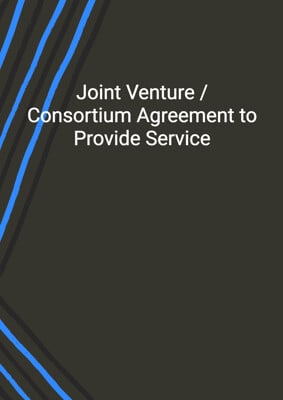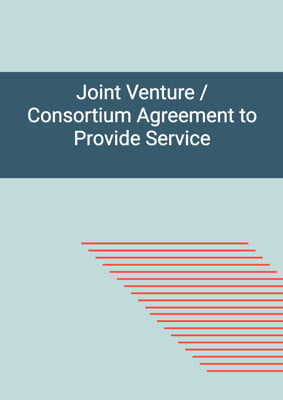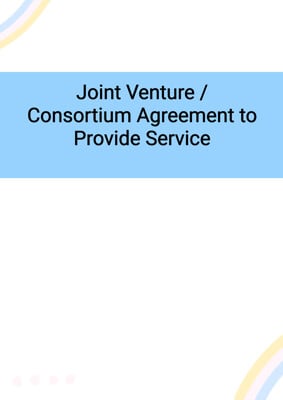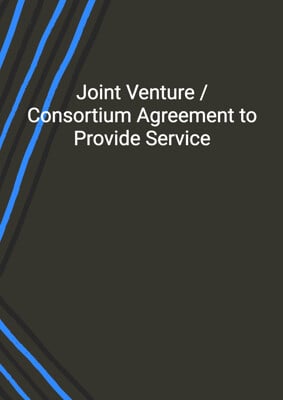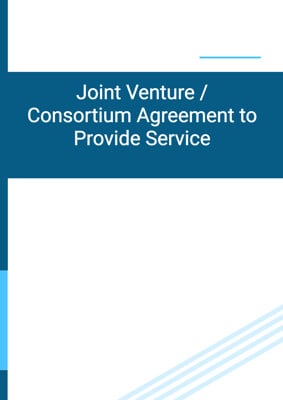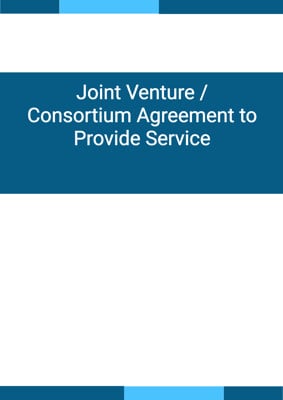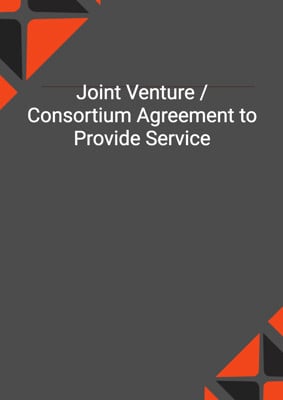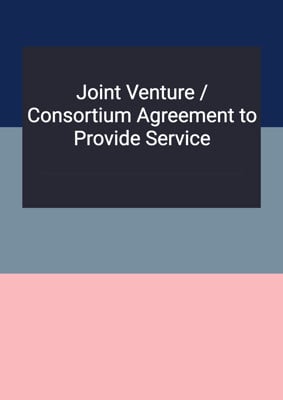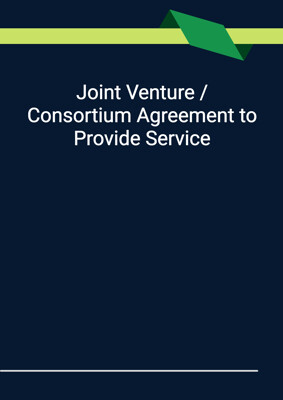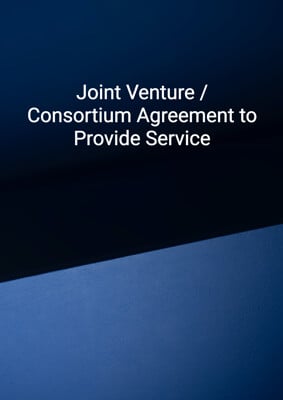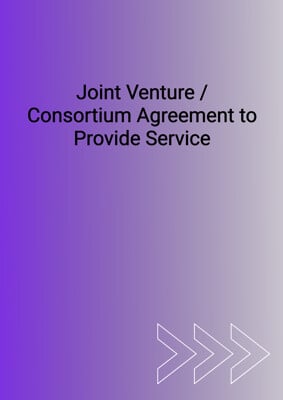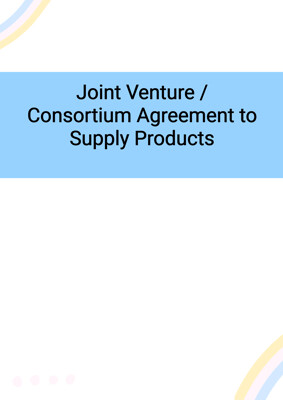
Joint Venture / Consortium Agreement to Provide Service
5 Parties - No Indemnity
Looking for an unincorporated joint venture or consortium agreement for a specific project? Our agreement covers 5 parties with no indemnity between participants, perfect for providing services to a client in a specific jurisdiction.
How to Tailor the Document for Your Need?
01
Create Document
Fill in the details of the parties. You can click the "Fill with Member’s Information" button to complete it with information saved to your account.
02
Fill Information
Please fill in any additional information by following the step-by-step guide on the left hand side of the preview document and click the "Next" button.
03
Get Document
When you are done, click the "Get Document" button and you can download the document in Word or PDF format.
04
Review Document
Please get all parties to review the document carefully and make any final modifications to ensure that the details are correct before signing the document.
Document Preview
Document Description
The Joint Venture / Consortium Agreement to Provide Service is a crucial document that outlines the terms and conditions for a joint venture between multiple parties to provide services. The importance of this document lies in its ability to establish clear roles, responsibilities, and obligations for each participant involved in the joint venture. It serves as a legally binding agreement that ensures all parties are on the same page and have a mutual understanding of the project.
The entire document is divided into several sections, each serving a specific purpose. The first section, titled 'Interpretation,' provides definitions for key terms used throughout the agreement. This ensures that all parties have a clear understanding of the terminology used.
The second section, 'Joint Venture,' establishes the formation of the joint venture and outlines its purpose. It specifies the tasks the joint venture will undertake, such as preparing and submitting a proposal to the client, negotiating with the client, and performing the services required for the project.
The third section, 'Proposal Submission,' details the process of preparing and submitting the proposal to the client. It emphasizes the importance of collaboration among the participants and designates the JV leader as the coordinator for the proposal's preparation and submission.
The fourth section, 'Performance of the Work,' outlines the obligations and responsibilities of each participant in carrying out the services. It highlights the need for compliance with the terms and conditions of the services agreement and specifies that any alterations or additions to the services require the client's consent.
The fifth section, 'Language,' states that the agreement will be written and interpreted in English, ensuring clarity and consistency in communication.
The sixth section, 'Exclusivity,' prohibits participants from engaging in any activity related to the project outside of the joint venture, ensuring focus and commitment to the joint venture's goals.
The seventh section, 'Executive Authority,' establishes the decision-making authority within the joint venture. It designates the policy committee, comprising representatives from each participant, as the body responsible for making decisions on policies and overseeing the joint venture's affairs.
The eighth section, 'Documents,' outlines the requirements for document production, including the use of the joint venture's name on all documents and the need for the services manager's signature on certain documents.
The ninth section, 'Personnel,' addresses the assignment of employees to the project and the responsibilities of each participant in managing its own staff. It also allows for the engagement of sub-consultants with the approval of the client and the participants.
The tenth section, 'Assignment and Third Parties,' restricts the transfer of rights or interests under the agreement without the consent of the participants. It also clarifies that the agreement does not confer any rights or causes of action upon third parties.
The eleventh section, 'Severability,' states that if any provision of the agreement is deemed invalid or unenforceable, it will be disregarded, and the remaining provisions will remain in effect. The parties will make reasonable efforts to replace the invalid provision with a valid one.
The twelfth section, 'Participant in Default,' addresses the procedures to be followed if a participant fails to fulfill its obligations under the agreement. It allows for the declaration of a defaulting participant and outlines the actions that can be taken by the other participants in such a situation.
The thirteenth section, 'Duration of the Agreement,' specifies the circumstances under which the agreement will terminate and the duration of its validity.
The fourteenth section, 'Liability,' establishes the participants' responsibilities in defending any claims arising from the performance of their obligations under the agreement.
The fifteenth section, 'Insurance,' requires each participant to maintain insurance coverage to protect against legal liabilities related to the works or services for which they are responsible.
The sixteenth section, 'Promotional and Project Costs, Profits, Losses, and Remuneration,' addresses the reimbursement of costs and expenses incurred in connection with the promotion, preparation, negotiation, and submission of the proposal. It also outlines the financial policy of the joint venture and the sharing of profits and losses among the participants.
The seventeenth section, 'Financial Administration and Accounting,' assigns responsibilities for financial administration and accounting to the participants. It covers the joint venture's accounting procedures, the maintenance of records and accounts, the preparation of invoices, and the handling of advance payments.
The eighteenth section, 'Guarantees and Bonds,' addresses the provision of guarantees and bonds by the participants and their responsibility for their administration.
The nineteenth section, 'Dispute Resolutions,' establishes the jurisdiction for resolving any disputes arising from the agreement.
The twentieth section, 'Notices and Service,' outlines the requirements for giving and receiving notices under the agreement, including the methods of service and the addresses of the parties.
The twenty-first section, 'Entire Agreement,' states that the agreement represents the entire understanding between the parties and supersedes any previous agreements or understandings.
The twenty-second section, 'Amendment,' specifies that any changes to the agreement must be in writing and signed by the parties.
The twenty-third section, 'No Rights of Third Parties,' clarifies that the agreement does not confer any rights on third parties.
In conclusion, the Joint Venture / Consortium Agreement to Provide Service is a comprehensive document that covers all aspects of the joint venture, including its formation, obligations, decision-making authority, financial administration, and dispute resolution. It ensures clarity, fairness, and accountability among the participants, ultimately contributing to the success of the joint venture and the project at hand.
How to use this document?
1. Establish the joint venture: Begin by clearly identifying the parties involved in the joint venture, including the JV leader and the participants. This will ensure that all parties are aware of their roles and responsibilities.
2. Prepare and submit the proposal: Collaborate with the other participants to prepare a comprehensive proposal that addresses the client's requirements. The JV leader should coordinate the preparation and submission of the proposal to ensure a cohesive and professional submission.
3. Perform the services: Once the services agreement is awarded, each participant must fulfill their obligations as outlined in the agreement. It is essential to comply with the terms and conditions of the services agreement and communicate effectively with the client to ensure the successful completion of the project.
4. Maintain financial administration: Each participant is responsible for their own financial affairs, including keeping accurate records and accounts. The JV leader should provide financial administration services as outlined in Schedule 2, ensuring proper invoicing and handling of payments.
5. Collaborate with the policy committee: Participate actively in the policy committee meetings, which serve as the decision-making body for the joint venture. Cooperate with other participants and act in the best interests of the joint venture to resolve any disputes or make important policy decisions.
6. Comply with insurance requirements: Maintain appropriate insurance coverage to protect against legal liabilities arising from the works or services provided. Ensure that all necessary insurances are in place and comply with the requirements of the services agreement.
7. Handle disputes effectively: In the event of a dispute, follow the procedures outlined in the agreement. Cooperate with the other participants and provide any necessary information to defend against claims. Seek resolution through negotiation and, if necessary, through the agreed dispute resolution mechanisms.
8. Keep accurate documentation: Maintain proper records of all project-related documents, including correspondence with the client and any sub-consultants. Ensure that all documents are signed and circulated to the relevant parties in a timely manner.
9. Adhere to confidentiality obligations: Maintain confidentiality of any information obtained through participation in the joint venture. Seek approval before using project-related information for promotional purposes.
10. Comply with local laws and regulations: Familiarize yourself with the laws and regulations of the project's jurisdiction and ensure compliance in all aspects of the joint venture's operations.
11. Provide timely notice: Communicate any changes in name, address, or contact details to the other participants in a timely manner. Ensure that all notices required under the agreement are given in writing and in accordance with the specified methods of service.
12. Seek legal advice if needed: If you have any doubts or concerns regarding the agreement or its implementation, seek legal advice to ensure compliance and protect your interests.
Note: This guidance is provided for informational purposes only and should not be considered legal advice. It is essential to consult with legal professionals to ensure compliance with applicable laws and regulations.
Not the right document?
Don’t worry, we have thousands of documents for you to choose from:



